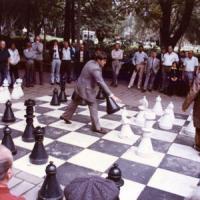
Bums on Seats
Words aren't always what they seem. Sometimes longer words can be really small—like nasturtium, for instance—because it has only one meaning. It's a flower. On the other hand, some short words can be quite large—like bum. Bum has so many meanings it makes nasturtium look like a shrinking violet.
Let's look at some of bum's meanings:
-
a despicable or contemptible person; as in, “Throw the bum out.”
-
a tramp.
-
to beg or borrow: “I've gotta bum a cigarette.”
-
an idler: a lazy bum.
-
to be lazy: bumming around.
-
that part of the body, in the general vicinity of the gluteus maximus, that's so useful when we want to sit down.
To an entrepreneur looking to fill a venue with paying customers, “bums on seats” refers to the last of those definitions but, as I realised during the week, this versatile word is capable of adaptation even at that level.
It all started when I received a note from White Phoenix, a Sydney-based chess player, who asked, “Have you ever been to Hyde Park and played chess with the hobos there?”
Yes, I have.
During the 1970s I had a telecommunications job with peak periods at both ends of the working day. My employer solved his problem by introducing a broken shift with a two hour (unpaid) lunch break and I filled in the time by playing chess in Hyde Park—Sydney's equivalent to Washington Square Park.
I never thought of my opponents as hobos. Sure, there were some who qualified under definition 2 but those were mostly bystanders who were definition 3-ing money or smokes from the chess players. On the other hand there were was a fairly prominent contingent who chose to live on unemployment benefits and who spent their days playing chess. They were definition 4s and made up a good percentage of the denizens as they definition 5-ed their day away. They also made possible an alternate meaning to definition 6—they were bums on seats.
The majority of the park players didn't fit any of the above definitions and were office workers out to enjoy the sunshine during their lunch break. They included a lot of personalities and a smattering of very good players.
John Curtis (in the small pic at the top of this post) was a park regular. Ten times New South Wales Lightning Champion, he was the current City of Sydney Champion when he accepted a challenge to play on the giant chess set. His opponent was a fairly strong player, although completely outclassed; but always a gentleman, John allowed the guy to take back a piece after losing it. Three times! Eventually he gave the man too many second chances and lost. Far from being humble about the rather suspect win, the guy said, “You not so good, Mr Champion. Who is champion now, eh?” The poor man didn't realise that, by any acceptable standard, he had lost the game three times before Curtis gave him that last chance. Given his boasting reaction, I guess he'd qualify as a bum under definition 1.
One of the regulars in those days was an elderly Czech named Happy. Well, that's what everybody called him because he always seemed to be smiling. He loved to play and, although he rarely won a game, we all took it easy on him. One day he was playing at the chess tables near the southern end of the park and his opponent, an ill-mannered definition 1-type youngster, kept insulting him and sneering at his every move. Happy, looked distinctly miserable but saw the game through without complaint. When it was over, one of the spectators said, “I don't play as well as Happy, son, but I'd love to give you a game.” Yeah! Right. It wasn't long before Happy started to smile again as the boy's game deteriorated amid a chorus of comments from the kibbitzers about the quality of his play. We never saw him in the park again.
Of course laughter and disaster have a certain assonance, and what makes one person laugh might upset another. Odd that, isn't it? Once, my friend Richard and I were watching a game when a seagull (the park is full of them) targeted his head. SPLAT! Everybody thought it was funny, although I can understand Richard's less-than-happy reaction. He was a mess.

Not all the games were friendly, and not all opponents were friends. Often there were arguments, but only once was I ever present when there was actual violence. I was playing on the giant set when my opponent suddenly raced off across the park. I wondered if it was something I'd said but, about seventy metres away, he spun a man around and decked him. It was a pretty good punch—short, with a lot of body behind it. Then he picked up the bag the guy had just stolen and resumed our game as though nothing had happened. I thought about resigning in case I got the same treatment but he'd calmed down by then. The thief was probably unlucky—he'd stolen the bag when it was my turn to move; had he done it on my opponent's move he might have got away with it.
I don't have any park games to post—we didn't waste much time with score sheets—but you'll find this one entertaining. It's a quick win by seven-time Hungarian champion GM Zoltan Almasi, over Anatoly Karpov. And in case you were wondering how such a player could lose in only twenty-two moves, this was played in the 2001 Amber Blindfold Tournament. It's not park chess, but it's fun.

